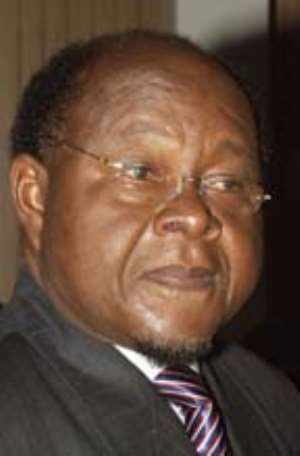
The Minister of Energy, Prof Mike Oquaye,has stated that the taxes and levies included in fuel prices have helped to stabilise the economy.
He said besides helping to mobilise more revenue to support national development,the taxes had been used to build the Residual Fluidised Catalytic Cracking (RFCC) plant, increase the country's oil reserves and increase the pace of oil exploration.
In an interview to react to critics who claimed that the taxes and levies component of fuel prices should be reduced,Prof Oquaye said the efficient use of the taxes by the government had culminated in the prices of the product being pegged within the reach of Ghanaians, despite world events which had made oil prices to soar on the international market.
“With current world events, both natural and man-made, it is clear that but for the good policies and concrete strategies put in place by this government,the country would have been overwhelmed by the increases in the price of crude oil on the world market,” he added.
Prof Ocquaye said it was through such taxes and levies that the government was able to build the RFCC plant that had brought efficiency into the production of oil products and made the country to derive maximum benefit from the Tema Oil Refinery (TOR).
He said most countries which did not have refineries,let alone RFCC plants,were finding it difficult to bear with the current situation.
The minister said it was through the taxes and levies on petroleum products that the government had been able to reduce to the barest minimum the debt of TOR,which had a negative impact on the entire economy of the country in the past.
He quoted Mr Kwame Peprah,a former Finance Minister in the National Democratic Congress (NDC) government,as once telling Parliament during the presentation of the budget that “without taxes and levies in petroleum product prices, development in the country would come to a standstill”.
He said Mr Peprah made the comment when the taxes component in the prices of fuel products was hovering above 50 per cent.
Prof Ocquaye cited 1993, during the NDC era,when 57 per cent of fuel prices consisted of taxes and levies.
The Energy Minister said such taxes were undeniably the lifeblood of governments,saying that the NPP government had gone ahead to use the taxes efficiently to increase the nation's oil reserve to more than two weeks.
He said the reserve,which was less than a week when the NPP government took over, was currently being worked on by the Bulk Oil Storage and Transport (BOST) Company to increase it from two weeks to six weeks.
Prof Ocquaye said all these would serve as shock absorbers for the country in the event that the world market price worsened,as was being anticipated in the coming winter,a period associated with high oil prices.
Prof Ocquaye said through the oil exploration levy,four renowned oil companies were exploring oil at levels that had never been attained by the country and expressed the hope that it would yield benefits.
When reached for his comment,Mr Ato Ahwoi,a leading member of the NDC,said the increases were unnecessary,since the government could have used part of the taxes component to defray the rising cost of oil in the world market.
He argued that since the taxes and levies component was ¢12,900 and the increase on premium was only ¢1,500,as announced by the National Petroleum Authority (NPA),the government could have used part of the ¢12,900 to absorb the increase.
On the percentage of taxes that constituted the entire price of petroleum products, Mr Ahwoi said when the NDC was handing over power to the NPP administration,the tax component of the prices was only 27.16 per cent




 COVID-19: GHS records 57% vaccination coverage
COVID-19: GHS records 57% vaccination coverage
 My government will support churches – Bawumia assures Clergy
My government will support churches – Bawumia assures Clergy
 Mahama, Bawumia and Alan have flatly failed Ghanaians – Kofi Akpaloo
Mahama, Bawumia and Alan have flatly failed Ghanaians – Kofi Akpaloo
 PAC warns public institutions to comply with the Public Procurement Act
PAC warns public institutions to comply with the Public Procurement Act
 Voter registration: NDC slams EC’s refusal to share serial numbers of BVR kits
Voter registration: NDC slams EC’s refusal to share serial numbers of BVR kits
 Akufo-Addo's 'corrupt, yenkyendi cronyism' cost Ghana $190m stake in US Millenni...
Akufo-Addo's 'corrupt, yenkyendi cronyism' cost Ghana $190m stake in US Millenni...
 Don't be 'conduit' to President Akufo-Addo's 'I can't hand over power to Mahama'...
Don't be 'conduit' to President Akufo-Addo's 'I can't hand over power to Mahama'...
 NDC's hypocrisy exposed as party executive implicated in registration of minors
NDC's hypocrisy exposed as party executive implicated in registration of minors
 PDS Scandal: The totality of our loss is the mess we seen in the power sector to...
PDS Scandal: The totality of our loss is the mess we seen in the power sector to...
 US Millennium Compact: It's disheartening for Ghana to lose $190 million power d...
US Millennium Compact: It's disheartening for Ghana to lose $190 million power d...
